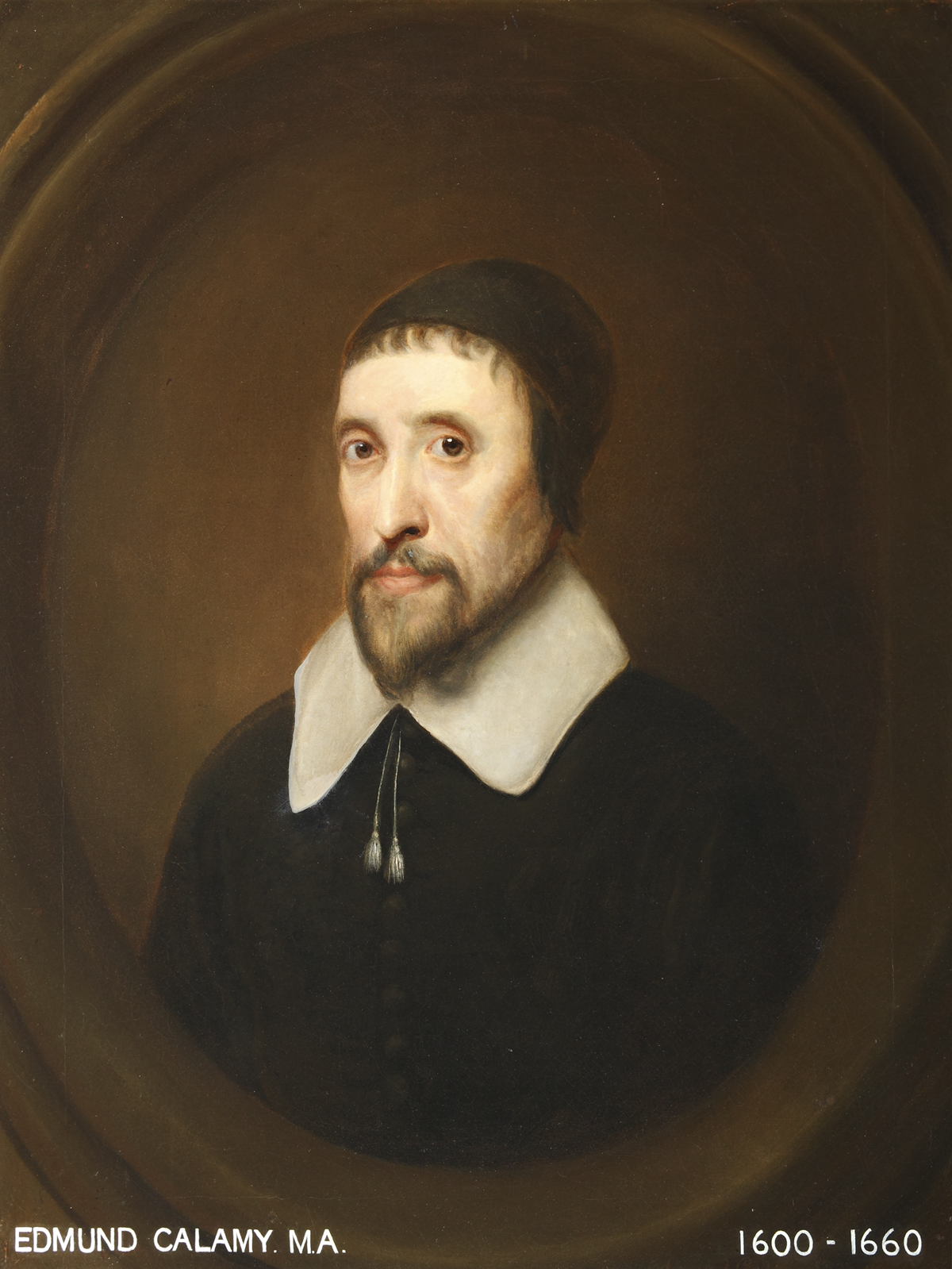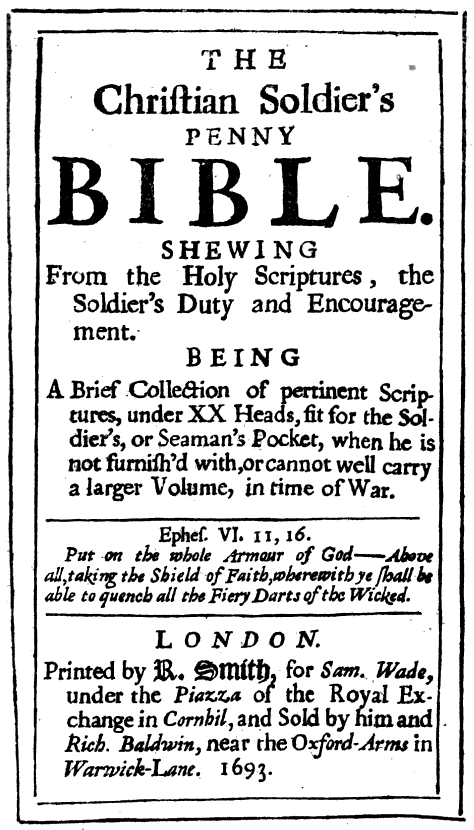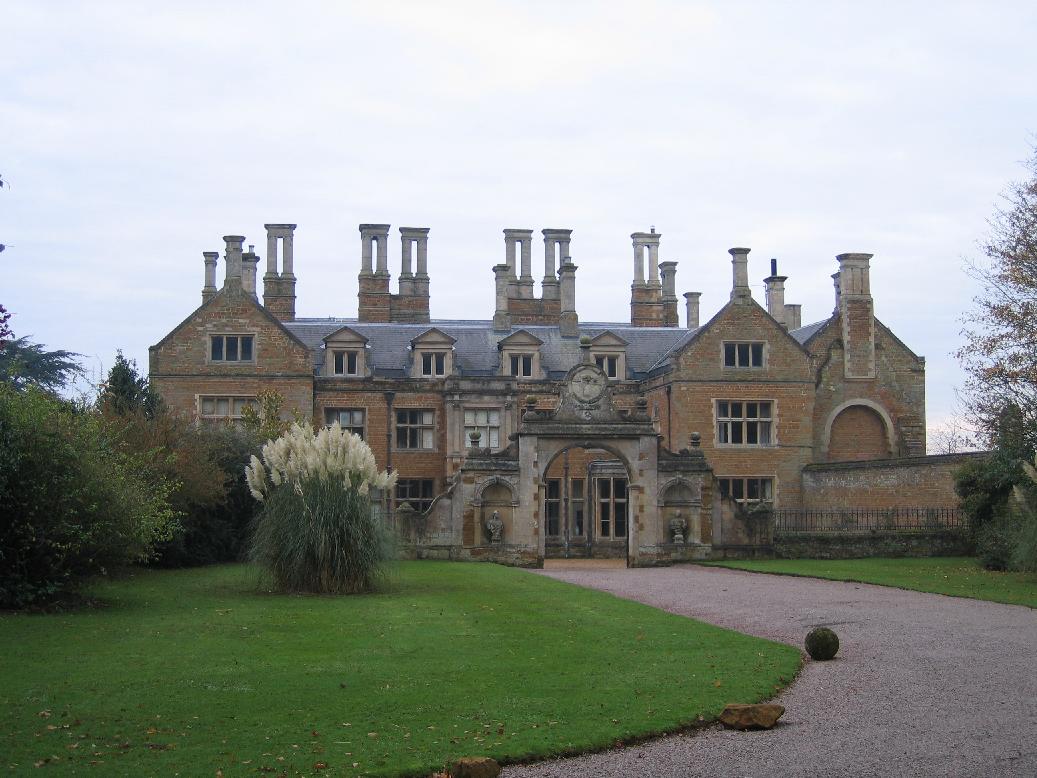|
Robert Ram
Robert Ram (c.1595-1656) was an Anglican priest in the early seventeenth century. He was a younger son of Thomas Ram, Bishop of Ferns and Leighlin. Robert Ram went to Trinity College Dublin. He was awarded a Bachelor of Arts in 1611, Master of Arts in 1614 and became a Fellow in 1615. He was incorporated as Master of Arts by the University of Cambridge in 1615. He became Vicar of St Mary and St Nicolas, Spalding in 1626. In 1637 he established a Parish Library, the books from which are in the care of Spalding Gentlemen's Society. During the English Civil War he was taken from his home by Royalists ("Cavaliers") and held hostage in Crowland. He was rescued by Parliamentarian regiments commanded by Sir Miles Hubbard, Sir Anthony Irby and Oliver Cromwell, following the siege of Crowland in April 1643. In 1645 he was appointed Chaplain to Colonel Sir Edward Rossiter's Lincolnshire Cavalry Regiment He was the author of The Soldiers’ Catechism which was issued to the New Model A ... [...More Info...] [...Related Items...] OR: [Wikipedia] [Google] [Baidu] |
New Model Army - Soldier's Catechism
New is an adjective referring to something recently made, discovered, or created. New or NEW may refer to: Music * New, singer of K-pop group The Boyz (South Korean band), The Boyz Albums and EPs * New (album), ''New'' (album), by Paul McCartney, 2013 * New (EP), ''New'' (EP), by Regurgitator, 1995 Songs * New (Daya song), "New" (Daya song), 2017 * New (Paul McCartney song), "New" (Paul McCartney song), 2013 * New (No Doubt song), "New" (No Doubt song), 1999 *"new", by Loona from ''Yves (single album), Yves'', 2017 *"The New", by Interpol from ''Turn On the Bright Lights'', 2002 Acronyms * Net economic welfare, a proposed macroeconomic indicator * Net explosive weight, also known as net explosive quantity * Network of enlightened Women, a conservative university women's organization * Next Entertainment World, a South Korean film distribution company Identification codes * Nepal Bhasa language ISO 639 language code * New Century Financial Corporation (NYSE stock abbreviation ... [...More Info...] [...Related Items...] OR: [Wikipedia] [Google] [Baidu] |
Cavalier
The term Cavalier () was first used by Roundheads as a term of abuse for the wealthier royalist supporters of King Charles I and his son Charles II of England during the English Civil War, the Interregnum, and the Restoration (1642 – ). It was later adopted by the Royalists themselves. Although it referred originally to political and social attitudes and behaviour, of which clothing was a very small part, it has subsequently become strongly identified with the fashionable clothing of the court at the time. Prince Rupert, commander of much of Charles I's cavalry, is often considered to be an archetypal Cavalier. Etymology Cavalier derives from the same Latin root as the Italian word and the French word (as well as the Spanish word ), the Vulgar Latin word '' caballarius'', meaning 'horseman'. Shakespeare used the word ''cavaleros'' to describe an overbearing swashbuckler or swaggering gallant in Henry IV, Part 2 (c. 1596–1599), in which Robert Shallow says "I'll drink ... [...More Info...] [...Related Items...] OR: [Wikipedia] [Google] [Baidu] |
17th-century English Anglican Priests
The 17th century lasted from January 1, 1601 ( MDCI), to December 31, 1700 ( MDCC). It falls into the early modern period of Europe and in that continent (whose impact on the world was increasing) was characterized by the Baroque cultural movement, the latter part of the Spanish Golden Age, the Dutch Golden Age, the French '' Grand Siècle'' dominated by Louis XIV, the Scientific Revolution, the world's first public company and megacorporation known as the Dutch East India Company, and according to some historians, the General Crisis. From the mid-17th century, European politics were increasingly dominated by the Kingdom of France of Louis XIV, where royal power was solidified domestically in the civil war of the Fronde. The semi-feudal territorial French nobility was weakened and subjugated to the power of an absolute monarchy through the reinvention of the Palace of Versailles from a hunting lodge to a gilded prison, in which a greatly expanded royal court could be more easi ... [...More Info...] [...Related Items...] OR: [Wikipedia] [Google] [Baidu] |
17th-century English Puritan Ministers
The 17th century lasted from January 1, 1601 ( MDCI), to December 31, 1700 ( MDCC). It falls into the early modern period of Europe and in that continent (whose impact on the world was increasing) was characterized by the Baroque cultural movement, the latter part of the Spanish Golden Age, the Dutch Golden Age, the French ''Grand Siècle'' dominated by Louis XIV, the Scientific Revolution, the world's first public company and megacorporation known as the Dutch East India Company, and according to some historians, the General Crisis. From the mid-17th century, European politics were increasingly dominated by the Kingdom of France of Louis XIV, where royal power was solidified domestically in the civil war of the Fronde. The semi-feudal territorial French nobility was weakened and subjugated to the power of an absolute monarchy through the reinvention of the Palace of Versailles from a hunting lodge to a gilded prison, in which a greatly expanded royal court could be more easily k ... [...More Info...] [...Related Items...] OR: [Wikipedia] [Google] [Baidu] |
Spalding, Lincolnshire
Spalding () is a market town on the River Welland in the South Holland district of Lincolnshire, England. The town had a population of 31,588 at the 2011 census. The town is the administrative centre of the South Holland District. The town is located between the cities of Peterborough and Lincoln, as well as the towns of Bourne, March, Boston, Wisbech, Holbeach and Sleaford. The town was well known for the annual Spalding Flower Parade, held from 1959 to 2013. The parade celebrated the region's vast tulip production and the cultural links between the Fens and the landscape and people of South Holland. At one time, it attracted crowds of more than 100,000. Since 2002 the town has held an annual pumpkin festival in October. History Ancient Archaeological excavations at Wygate Park in Spalding have shown that there has been occupation in this area from at least the Roman period, when this part of Lincolnshire was used for the production of salt. It was a coastal siltland. At Wyg ... [...More Info...] [...Related Items...] OR: [Wikipedia] [Google] [Baidu] |
Edmund Calamy The Elder
Edmund Calamy (February 160029 October 1666) was an English Presbyterian church leader and divine. Known as "the elder", he was the first of four generations of nonconformist ministers bearing the same name. Early life The Calamy family claimed to be of Huguenot descent. Edmund Calamy was born in the parish of St Thomas the Apostle, London, and educated at Merchant Taylors' School and then Pembroke College, Cambridge, where his opposition to Arminianism excluded him from a fellowship. Nicholas Felton, Bishop of Ely, nevertheless made him his chaplain, and gave him the living of St Mary, Swaffham Prior, which he held till 1626. He then moved to Bury St Edmunds, where he lectured for ten years; the later Congregationalist Jeremiah Burroughs was another preacher in the town. He retired when his bishop Matthew Wren insisted on the observance of certain ceremonial articles: Calamy refused to read out the ''Book of Sports'' in his church. In 1636 he was appointed rector (or pe ... [...More Info...] [...Related Items...] OR: [Wikipedia] [Google] [Baidu] |
The Souldiers Pocket Bible
''The Souldiers Pocket Bible'' (aka ''Cromwell's Soldiers' Pocket Bible'', ''The Soldier's Pocket Bible, Cromwell's Soldier's Bible'') was a pamphlet version of the Protestant Bible that was carried by the soldiers of Oliver Cromwell's New Model Army during the English Civil War. Description ''The Souldiers Pocket Bible'' (lacking a possessive apostrophe in the title) was first issued in 1643 to Cromwell's army and was put in general use among his soldiers. It has been of historical record that Cromwell's soldiers were provided with a small pocket Bible. George Livermore, an American book collector from Cambridgeport, Massachusetts, discovered a copy of ''The Souldiers Pocket Bible'' in 1854; he realized that the Bible which Cromwell's soldiers were known to carry was not the complete Protestant Bible of 66 books, but a condensed pamphlet version. It was an octavo booklet (5½ × 3″, 136 × 78mm). In comparison, it was about the size and thickness of an international travel pas ... [...More Info...] [...Related Items...] OR: [Wikipedia] [Google] [Baidu] |
New Model Army
The New Model Army was a standing army formed in 1645 by the Parliamentarians during the First English Civil War, then disbanded after the Stuart Restoration in 1660. It differed from other armies employed in the 1639 to 1653 Wars of the Three Kingdoms in that members were liable for service anywhere in the country, rather than being limited to a single area or garrison. To establish a professional officer corps, the army's leaders were prohibited from having seats in either the House of Lords or House of Commons. This was to encourage their separation from the political or religious factions among the Parliamentarians. The New Model Army was raised partly from among veteran soldiers who already had deeply held Puritan religious beliefs, and partly from conscripts who brought with them many commonly held beliefs about religion or society. Many of its common soldiers therefore held dissenting or radical views unique among English armies. Although the Army's senior officers d ... [...More Info...] [...Related Items...] OR: [Wikipedia] [Google] [Baidu] |
Edward Rossiter
Colonel Sir Edward Rossiter, 1 January 1618 to 9 January 1669, was an English landowner, soldier and politician from Lincolnshire. He fought for the Parliamentarians in the Wars of the Three Kingdoms and was an MP at various times between 1646 and 1660. When the First English Civil War began in August 1642, Rossiter joined the Eastern Association army, then transferred to the New Model Army in April 1645. He also played a prominent role in the civil administration of the East Midlands, and was nominated MP for Grimsby in March 1646. He commanded the guard at Holdenby House, where Charles I was held from February to June 1647, before being dismissed by the Army Council in August. Restored to the army during the 1648 Second English Civil War, he suppressed Royalist revolts in South Yorkshire and Lincolnshire. One of the MPs excluded from the Commons by Pride's Purge in December 1648, Rossiter opposed the Execution of Charles I in January 1649, unlike his grandfather Sir Joh ... [...More Info...] [...Related Items...] OR: [Wikipedia] [Google] [Baidu] |
Oliver Cromwell
Oliver Cromwell (25 April 15993 September 1658) was an English politician and military officer who is widely regarded as one of the most important statesmen in English history. He came to prominence during the 1639 to 1651 Wars of the Three Kingdoms, first as a senior commander in the Parliamentarian army and then as a politician. A leading advocate of the execution of Charles I in January 1649, which led to the establishment of the Republican Commonwealth of England, Scotland and Ireland, he ruled as Lord Protector from December 1653 until his death in September 1658. Cromwell nevertheless remains a deeply controversial figure in both Britain and Ireland, due to his use of the military to first acquire, then retain political power, and the brutality of his 1649 Irish campaign. Educated at Sidney Sussex College, Cambridge, Cromwell was elected MP for Huntingdon in 1628, but the first 40 years of his life were undistinguished and at one point he contemplated emigration to ... [...More Info...] [...Related Items...] OR: [Wikipedia] [Google] [Baidu] |
Roundhead
Roundheads were the supporters of the Parliament of England during the English Civil War (1642–1651). Also known as Parliamentarians, they fought against King Charles I of England and his supporters, known as the Cavaliers or Royalists, who claimed rule by absolute monarchy and the principle of the divine right of kings. The goal of the Roundheads was to give to Parliament the supreme control over executive administration of the country/kingdom. Beliefs Most Roundheads sought constitutional monarchy in place of the absolute monarchy sought by Charles; however, at the end of the English Civil War in 1649, public antipathy towards the king was high enough to allow republican leaders such as Oliver Cromwell to abolish the monarchy completely and establish the Commonwealth of England. The Roundhead commander-in-chief of the first Civil War, Thomas Fairfax, remained a supporter of constitutional monarchy, as did many other Roundhead leaders such as Edward Montagu, 2nd Earl of ... [...More Info...] [...Related Items...] OR: [Wikipedia] [Google] [Baidu] |
Crowland
Crowland (modern usage) or Croyland (medieval era name and the one still in ecclesiastical use; cf. la, Croilandia) is a town in the South Holland district of Lincolnshire, England. It is situated between Peterborough and Spalding. Crowland contains two sites of historical interest, Crowland Abbey and Trinity Bridge. History The town's two historical points of interest are the ruined medieval Crowland Abbey and the 14th-century three-sided bridge, Trinity Bridge, which stands at its central point and used to be the confluence of three streams. In about 701, a monk named Guthlac came to what was then an island in the Fens to live the life of a hermit. Following in Guthlac's footsteps, a monastic community came into being here, which was dedicated to Saint Mary the Virgin, Saint Bartholomew and Saint Guthlac in the eighth century. The place-name 'Crowland' is first attested circa 745 AD in the ''Vita S. Guthlaci auctore Felice'', reprinted in the ''Memorials of Saint Guthl ... [...More Info...] [...Related Items...] OR: [Wikipedia] [Google] [Baidu] |






_by_Robert_Walker_and_studio.jpg)


